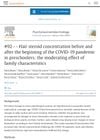 52 citations,
January 2022 in “Current Research in Pharmacology and Drug Discovery”
52 citations,
January 2022 in “Current Research in Pharmacology and Drug Discovery” New treatments for COVID-19 show promise, but more effective antiviral drugs are needed.
10 citations,
February 2022 in “Epidemiologia” One-third of COVID-19 patients had long-term symptoms like hair loss and fatigue, with women, older individuals, blood group B, smokers, and those with more virus exposure at higher risk.
 1 citations,
April 2022 in “Global health & medicine”
1 citations,
April 2022 in “Global health & medicine” Long COVID in Japan involves persistent symptoms like fatigue and may be caused by lasting organ damage and prolonged inflammation, with vaccination as a potential treatment.
 1 citations,
March 2021 in “The Journal of Sexual Medicine”
1 citations,
March 2021 in “The Journal of Sexual Medicine” The letter suggests testosterone replacement therapy might worsen COVID-19 outcomes.
 4 citations,
November 2021 in “Journal of the European Academy of Dermatology and Venereology”
4 citations,
November 2021 in “Journal of the European Academy of Dermatology and Venereology” There might be a skin condition related to COVID-19.
 December 2021 in “Turkderm”
December 2021 in “Turkderm” The COVID-19 pandemic led to fewer dermatology patients, more stress-related skin conditions during the crisis, and a rise in contact dermatitis after, with ongoing concerns for public health and treatment delays.
 1 citations,
May 2021 in “International Journal Of Medical Science And Clinical Invention”
1 citations,
May 2021 in “International Journal Of Medical Science And Clinical Invention” Women with PCOS may have a higher risk of severe COVID-19 due to hormonal imbalances and vitamin D deficiency.
 1 citations,
October 2020 in “Research Square (Research Square)”
1 citations,
October 2020 in “Research Square (Research Square)” Men with male pattern baldness had worse COVID-19 symptoms, but early treatment with certain drugs improved outcomes for all.
 1 citations,
January 2023 in “Brazilian Journals Editora eBooks”
1 citations,
January 2023 in “Brazilian Journals Editora eBooks” Children's screen time increased during the pandemic, causing various health issues.
 2 citations,
July 2021 in “Dermatologic Therapy”
2 citations,
July 2021 in “Dermatologic Therapy” A woman's hair loss after COVID-19 was likely due to a mix of pressure-induced alopecia and acute telogen effluvium.
 February 2024 in “Psychoneuroendocrinology”
February 2024 in “Psychoneuroendocrinology” The COVID-19 pandemic did not significantly change stress levels in preschoolers, but higher-income families' children showed higher stress.
 1 citations,
November 2022 in “Anais Brasileiros de Dermatologia”
1 citations,
November 2022 in “Anais Brasileiros de Dermatologia” Many hospitalized children with COVID-19 had skin, mouth, or nail changes, with skin rashes being common.
 1 citations,
April 2021 in “Clinical and Experimental Dermatology”
1 citations,
April 2021 in “Clinical and Experimental Dermatology” The COVID-19 pandemic has caused a 57% increase in interest in facial cosmetic procedures, leading to calls for better industry regulation and professional standards.
 September 2022 in “Journal of The American Academy of Dermatology”
September 2022 in “Journal of The American Academy of Dermatology” Different types of hair loss are linked to COVID-19, with some types possibly increasing risk of getting the virus, while others may be triggered or worsened by the virus.
 12 citations,
November 2021 in “Journal of Clinical Medicine”
12 citations,
November 2021 in “Journal of Clinical Medicine” Kidney transplant patients who had COVID-19 experienced a significant drop in their quality of life due to long-lasting symptoms.
 3 citations,
May 2021 in “British Journal of Dermatology”
3 citations,
May 2021 in “British Journal of Dermatology” The COVID-19 pandemic led to fewer skin checks and skin cancer diagnoses in Australia in 2020.

Topical Minoxidil is effective for hair loss after COVID-19.
 November 2024 in “The Medical Journal of Australia”
November 2024 in “The Medical Journal of Australia” Long COVID has severely affected a couple's health, finances, and social life.
 January 2021 in “Erciyes medical journal”
January 2021 in “Erciyes medical journal” The COVID-19 pandemic changed the types of skin conditions seen at a clinic, with fewer patients and varying numbers of specific conditions.
 April 2024 in “The Egyptian Family Medicine Journal/The Egyptian Family Medicine Journal ”
April 2024 in “The Egyptian Family Medicine Journal/The Egyptian Family Medicine Journal ” Vitamin D supplements significantly improved post-COVID-19 symptoms in deficient patients.
 December 2023 in “Health Information Jurnal Penelitian”
December 2023 in “Health Information Jurnal Penelitian” Post-COVID syndrome causes long-lasting symptoms like fatigue, breathing issues, and anxiety.
 April 2022 in “Research Square (Research Square)”
April 2022 in “Research Square (Research Square)” Long COVID recovery is hindered by smoking, with hair loss being a difficult symptom to treat.
 February 2023 in “Journal of clinical medicine research”
February 2023 in “Journal of clinical medicine research” Zinc acetate hydrate may help reduce fatigue and hair loss in post-COVID-19 patients.

Post-COVID-19 hair loss is not linked to vitamin D or quality of life but is linked to hair graying.
 June 2024 in “Research Square (Research Square)”
June 2024 in “Research Square (Research Square)” Copper deficiency is linked to post-COVID-19 hair loss in women.
July 2024 in “Vestnik dermatologii i venerologii” Post-COVID-19 hair loss is different from androgenetic alopecia and can be identified by lower copper and higher selenium levels.
 42 citations,
August 2021 in “Narra J”
42 citations,
August 2021 in “Narra J” Many COVID-19 survivors experience long-lasting symptoms, including hair loss and psychological issues.
 September 2022 in “Research, Society and Development”
September 2022 in “Research, Society and Development” Long-lasting symptoms like fatigue and breathlessness can persist after COVID-19, requiring ongoing medical follow-up.

A person with a new mutation in the SCN1A gene developed brain inflammation after COVID-19.
 December 2023 in “Y Dược học”
December 2023 in “Y Dược học” Older adults in Vietnam often experience hair loss after COVID-19, especially women, singles, and those hospitalized.




























